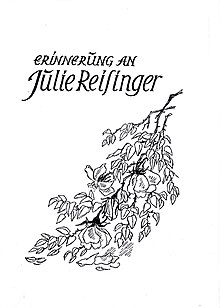Julie Reisinger
Julie Reisinger (born February 9, 1878 in Munich , † September 26, 1950 in Schondorf am Ammersee ) was a German reform pedagogue , teacher and country home manager .


Live and act
She was the third of four children of the Chief Medical Officer Joseph (von) Kerschensteiner, who carried out the pathological examination of the corpse of King Ludwig II , and his wife Julie, née. Reisenegger. Her uncle was the well-known school reformer Georg Kerschensteiner . After elementary school, the girl graduated from secondary school for girls . In 1895 Julie Kerschensteiner took the French and 1897 the English exams and then the French teacher exams in Lausanne . When she returned to Munich, she passed the teacher examination there in 1899. In addition, she was a guest student for botany and zoology at the University of Munich . The young teacher taught for four years in Munich at the “Töchterschule von Haydenaber”, where u. a. Ina Seidel was her student. Julie Kerschensteiner was also involved in the association for women's interests founded in Munich in 1894 , where she gave several lectures, for example on February 10, 1918 on "From the history of the education of girls". In the aforementioned association, she worked in particular with Helene Sumper , Rosa Kempf and Amalie Nacken .
At the age of 27, Julie Kerschensteiner opened her own private girls' institute in Schwabing with the support of Helene Sumper and Rosa Kempf , which bore her name. Their educational institution was one of the most prestigious of its time and was known far beyond the city's borders. Alongside Therese Giehse, one of the institute's best-known students is likely to have been the writer Claire Goll , whom the headmistress described extremely positively in her autobiographical novel Traumdancerin . In 1910 Ernst Reisinger came to the girls' school as a German teacher. The two fell in love and married on August 3, 1912. The marriage had three children.
In 1919 the couple moved to Schondorf am Ammersee. There it took over responsibility for the Schondorf country home three years later . In 1929 Ernst and Julie Reisinger transformed the private country home into a charitable foundation. Fritz Föhlisch wrote in memory of Julie Reisinger :
“She became the spiritual center of a community of more than 200 people. She was the mother for everyone, the adults helper and counselor, the children guide and comforter in all situations. She has given many of them decisive spiritual and emotional impulses for their whole life. "
In 1980 the Ernst and Julie Reisinger Memorial Foundation was established. With income from her assets, she supports projects in the humanities and natural sciences as well as international student and teacher exchange projects. The primary school of the Landheim Schondorf was baptized on October 1st, 2015 under the name "Julie-Kerschensteiner-Schule".
Works
- Thoughts about staying young. In: Communications from the Altlandheimer Bund Schondorf am Ammersee. Schondorf 1938, p. 12 ff.
- The double face of our time. In: Communications of the Altlandheimer Bund. Schondorf am Ammersee.
literature
- Manfred Berger : Julie and Ernst Reisinger - their life and work for the education and upbringing of young people. A contribution to the history of the rural education home movement. In: Zeitschrift für Erlebnispädagogik. H. 3/4, 1998, pp. 103-114.
- J. Bründl: comforter of many children. In: unicorn. 2016, p. 7.
- C. Goll: dream dancer. Years of youth. Munich 1971.
- L. Kraus et al. (Ed.): Memory of Julie Reisinger. Augsburg 1950.
- H. Theisen: Julie Kerschensteiner (1878–1950). In: Landeshauptstadt München (Ed.): FrauenLeben in München. Munich 1992, pp. 65-67.
Web links
- https://www.augsburger-allgemeine.de/landsberg/Sie-war-eine-beruehmte-Paedagogin-id35691372.html
- https://www.landheim-ammersee.de/schulleben/julie-kerschensteiner-grundschule
- https://www.landheim-ammersee.de/das-landheim/historie-stiftung
- ammerseekurier.de
Individual proof
| personal data | |
|---|---|
| SURNAME | Reisinger, Julie |
| BRIEF DESCRIPTION | German reform pedagogue, teacher and country home manager |
| DATE OF BIRTH | February 9, 1878 |
| PLACE OF BIRTH | Munich |
| DATE OF DEATH | September 26, 1950 |
| Place of death | Schondorf am Ammersee |